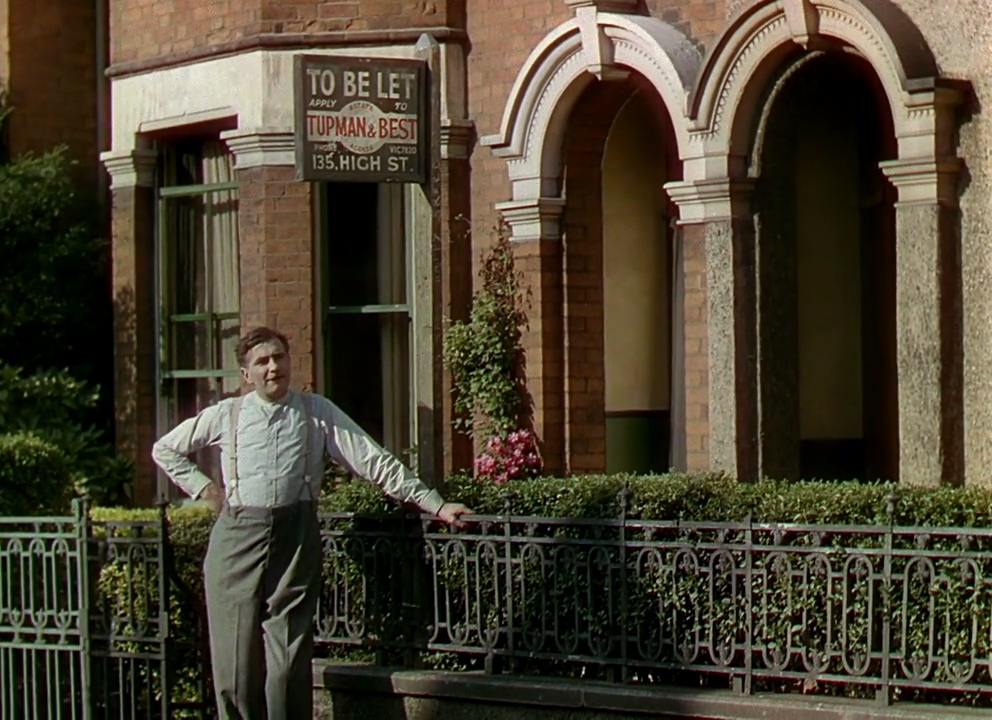
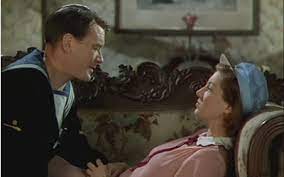
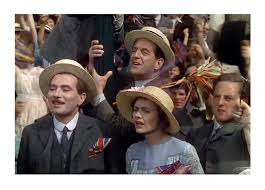
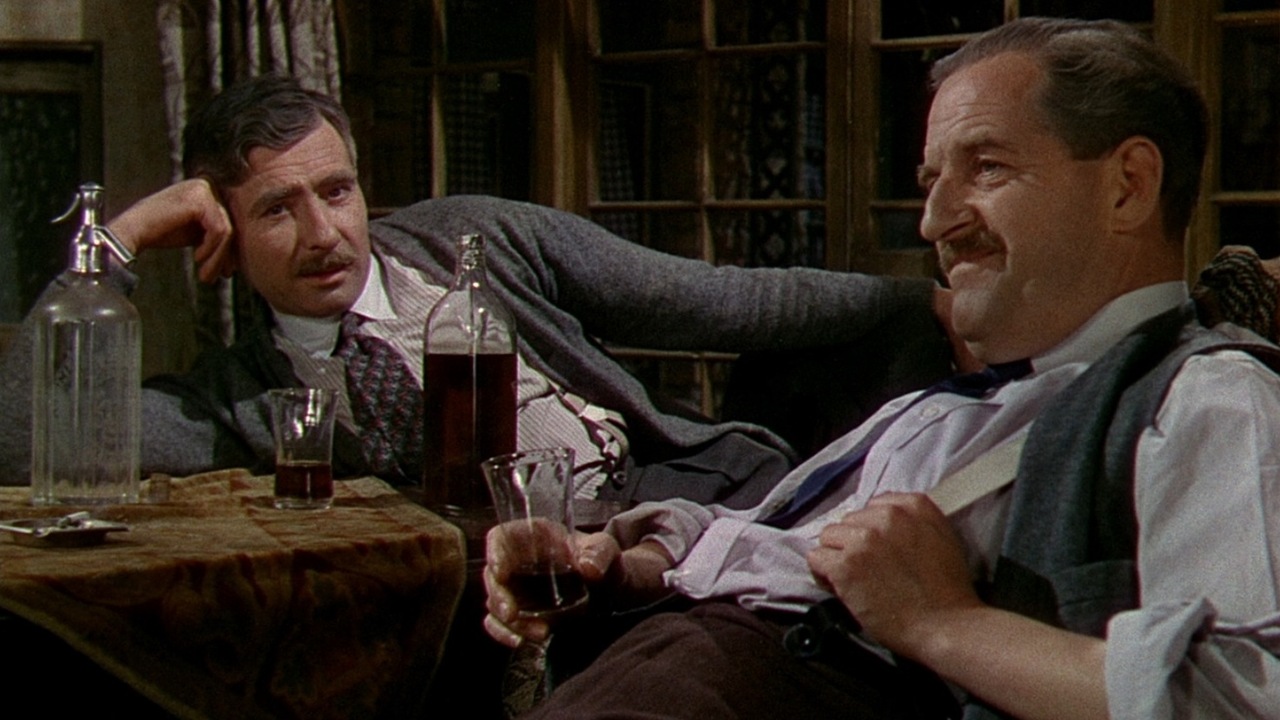
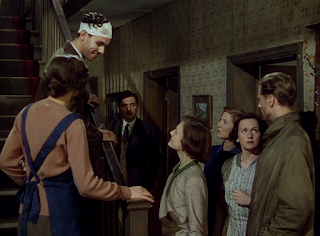
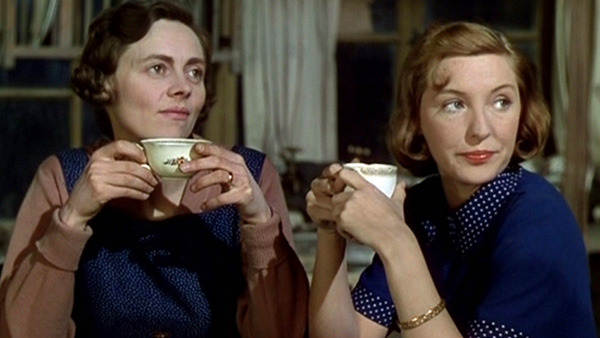
“This Happy Breed” is a middling if affectionate domestic melodrama that spun out of the creative fervor of playwright Noël Coward‘s most productive years, the 1920s and ’30s. It was Coward’s attempt at peeking in on the working class he came from and left behind. Preserved on film with a lavish late-war Technicolor production in 1944, one can only wonder if it didn’t feel a bit bougie even to audiences back then, as if this posh panderer of the upper classes couldn’t help it.
But there’s little sense of his looking down on his subject and his characters in this 1939 play (first produced in ’42) that was filmed just as the World War it prefigures was winding down. Whatever the “family lives through the inter-war years” intent of the work while new, by the time it was released in the UK (making it to the US in 1947), it played like an appeal for a return to normalcy and a celebration of the “ordinary folks” who rode the tides of top-down economics, labor strife and political bungling, keep that stiff upper lip and “Rule Britannia” in their hearts and carry on.
“I wonder when the next war will be?”
“Not in our time, or our son’s time.”
The movie version would turn out to be “Lawrence of Arabia” director David Lean’s solo-directing debut. The editor-turned-director Lean split directing duties with Coward on the playwright/screenwriter’s fine destroyer-at-war drama “In Which We Serve” (1942). Here, he’s given the keys to the toyshop — a colorful, sound-stage and outdoor settings for military parades and the like remembrance of times “While England Slept,” if not a critique of “Why England Slept.”
Newly-restored, “Breed” is well worth a look, and makes a nice companion piece to mid-war “homefront” films like “Mrs. Miniver.”
It’s not Lean’s showiest picture or particularly impressive in any cinematic regard, at least partially owning to the limitations of Technicolor and Lean’s status as a newish director unfamiliar with color. But the script has a fluid throughline, the cast is spot-on and the performances have a life that transcends the affectations of the writing and pre-Method formality of British screen acting of the day.
We follow the Gibbons family through 20 years of modern British history, all of it lived in a High Street townhouse in Clapham, London. In 1919, the former Sgt. Frank Gibbons (Robert Newton) is newly “demobbed,” mustered-out of his army regiment and moving his family into their new home.
Frank has a job in a travel agency, arranging “battlefield tours” for a civilian populace that has no idea of the horrors he and his comrades faced.
Celia Johnson is wife Edith, still unused to not having “that weight” hanging over her, fearing every day’s mail because it might bring news of her husband’s death in the trenches.
They have three children — the spirited Queenie (Kay Walsh), more reserved and traditional Vi (Eileen Erskine) and son Reg (John Blythe).
Wonder of wonders, an old comrade in arms (Stanley Holloway) has already moved in next door. His son Billy (John Mills) is early in a career in the Royal Navy, and takes an instant shine to Queenie.
Some of the film’s tenderest and most Coward-like scenes are built around Queenie’s early realization that she “hates it here,” all this suburban myopia and the limited life it promises. She is the character Coward might have indentified with most, working class with a taste for the finer things, the faster life and high-living refinement. She rebuffs Billy more than once, tearfully arguing that she won’t make much of “a sailor’s wife.”
Son Reg gets mixed up with young political agitator Sam (Guy Vernery), who in between rants about capitalists and workers’ rights, takes up with unassuming Vi.
History marches by these characters — the 1924 British Empire Exhibition, the General Strike of 1926, elections going to Conservatives who reduce the size of the armed forces (by League of Nations arms treaties, the film leaves out), no real mention of the Great Depression, the funeral of King George V, the abdication of Edward VIII dealt with via a premature removal of a calendar, those first photos of Herr Hitler in the newspapers and first mentions of Japanese aggression in the Far East and “Peace for Our Time” a fading hope.
Frank’s politics and attempts to ignore the outside world are based on two simple facts. One, he’s home with his family and two “I belong to a generation of men, most of whom aren’t around any more.”
Through it all, there are weddings and tragedies, Charleston dance contests and bickering between Edith’s aged mother (Amy Veness) and Frank’s spinster sister (Alison Leggatt) all tied together by a general sense of pre-war pub-crawling, tea-drinking and “Keep Calm and Carry On” before it became a World War II motto.
Frank and others have the foresight to note that World War I led to a “tired” Britannia, and remind late-war and post-war audiences of the weight of that mass slaughter informing their refusal to accept that another war could be coming.
Coward, a salesman’s son who became poster boy for upper class wits, gets a few political digs in — sympathizing with labor despite the “down with everything” pronouncements of Sam and his fellows.
“Where they go wrong is trying to get things done too quickly,” Coward/Frank declares, reminding his wife that they’re a patient “nation of gardeners.”
Newton, a notorious alcoholic, gives his usual spirited performance despite whatever he was doing off-set and between takes. Was he really fined the equivalent of his entire salary for holding up the production?
Mills stands out in the supporting cast, giving Billy a lovesick puppy-dog demeanor and hard-edged, rising-through-the-ranks-pragmatism in later scenes when he stands up to mercurial Queenie. For all her “good time” cravings, her “sailor’s wife” qualms are validated when we see the destination sticker on her luggage in one of the film’s last scenes, set in 1939.
“Singapore.”
Its late arrival in cinemas washed away any mid-war propoganda value “This Happy Breed” (a phrase from Shakespeare’s “Richard II”) might have had. One can watch it now and see Coward getting in the first shots of revisionism in selectively reminding “the ordinary people” all the country went through thanks to the shock of World War I and the turmoil of the ’20s and ’30s. But it does give one a sense of context about the history this generation lived through without realizing what was coming, because most people didn’t.
And if we don’t see the future that awaited David Lean in this bland but colorful box office hit, we’d do that soon enough when he returned to black and white and discovered his flair for Charles Dickens adaptations.
Rating: approved
Cast: Robert Newton, Celia Johnson, Kay Walsh, Alison Leggatt, John Mills, Amy Veness, Eileen Erskine, John Blythe, Guy Verney and Stanley Holloway
Credits: Directed by David Lean, scripted by David Lean, Ronald Neame and Anthony Havelock-Allan, based on the play by Noel Coward. An Eagle Lion/Universal release on Tubi, Amazon, Youtube etc.
Running time: 1:50


